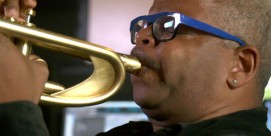In This Episode << SLIDE LEFT TO SEE ADDITIONAL SEGMENTS
Police Chief with Alzheimer’s
BOB ABERNETHY, anchor: We have a very personal story today about what happened to a man when, at the height of his powers, he discovered that he was sick — what happened to his work, his faith, and his town’s faith in him. Judy Valente reports on the police chief of Lexington, Illinois.
JUDY VALENTE: For 18 years, Spencer Johansen has been the popular police chief of rural Lexington, Illinois, population 1900.
Chief SPENCER JOHANSEN (Lexington Police Department, on patrol in car): I look around to see if anything’s out of the ordinary. You know, you grow up here all your life, you know all these streets and houses and stuff.
VALENTE: Johansen thought he’d retire here as police chief. But then …
Chief JOHANSEN: I missed a couple of court dates, nothing major, they were just minor traffic cases. But I missed them and that wasn’t like me. And then I just started having a problem with my concentration.
VALENTE: A maternal aunt of his had been diagnosed with Alzheimer’s in her late 30s and an uncle had died of the disease in his 50s. The chief decided to undergo a series of physical and neurological tests.
Dr. SAMUEL STEFFEN (during examination): Well Spencer, how is everything going?

“I have to trust God.” |
Chief JOHANSEN: Every doctor that I initially saw told me not to worry about it. They thought it was stress.
VALENTE: With tears in his eyes, Johansen’s family physician, Dr. Samuel Steffen, delivered the diagnosis: mild cognitive impairment. In layman’s terms — the early onset of Alzheimer’s.
About five million Americans have been diagnosed with Alzheimer’s. An estimated six to 10 percent are under the age of 60. Chief Johansen was only 49 at the time of his diagnosis. He was determined to continue to live a productive life.
JOHANSEN notified town officials immediately. They decided to keep him on the job for as long as doctors say he’s still capable of performing his duties.
Mayor JOHN MOHR (Lexington, IL): There’s been no criticism of keeping Spencer on the job. There’s been a little bit of concern about carrying the gun with him and things like that. But we’re high on Spencer’s judgment and that of his doctors to tell us when he has to change the responsibilities that he’s able to perform.
Dr. DOUGLAS GRANT (Neuropsychologist, Carle Clinic): He doesn’t meet the criteria for dementia, meaning he’s still able to work, he’s still able to drive, he’s still able to manage his finances, he’s still able to really live independently. And there hasn’t been a significant change in his general intellectual abilities.
VALENTE: From the first days after his diagnosis, Johansen began keeping what he calls a spiritual journal, a frank portrayal of his struggle to accept his diagnosis and hold on to his faith.
Chief JOHANSEN (reading from journal): July 18, 2007: Been really out of it lately. Don’t seem to care about much; little things getting on my nerves. I’d like to spend more time by myself — not good.

John Mohr |
I’ve had every minister of every church in Lexington approach me and offer assistance and I turned it all away. I wanted to be angry with somebody, you know. It’s not as if I smoked four packs of cigarettes a day to get this. It was nothing that I did. And I think I took my anger out on God.
VALENTE: JOHANSEN, who converted to Catholicism 25 years ago, quit going to Mass on Sunday. He fell into a deep depression.
Chief JOHANSEN (reading from journal): April 22, 2007: Feeling sorry for myself. Think it’s getting bad again. Wish I could end it in a way not to be a coward.
VALENTE: Trying to make sense of her father’s depression, JOHANSEN’s 17-year-old daughter, Maggie, poured her own feelings into a poem.
MAGGIE JOHANSEN (reading poem): I don’t know how to say this: The doctor said to him Alzheimer’s was detected. It’s a battle we’ll try to win. Alzheimer’s is uncommon for a man of 49. What about the other people who are starting to lose their mind? His journey is slowly ending. “I love you” is all they say. His family means the world to him. It was the saddest day.

Spiritual journal |
Chief JOHANSEN: There were some times during and after Christmas that I probably thought about doing something foolish. There were times when I thought about suicide. And it got to the point where I just wanted to — I didn’t want to put my wife and kids through this. It was then that I realized that this couldn’t go on. I needed to do something. Everyday, you know, I parked in front of the Lutheran church in town. This is where I sit every morning to make sure the kids get into school safely, and this is where I saw the sign, “When All Else Fails, Trust God.” It finally dawned on me that that message may be meant for me. I got to thinking about everybody who’s tried to help me, that’s approached me about my faith — every minister in town who has said, you know, has offered to help. So many people tried to help me in their own way and I shut them out. And suddenly those faces kind of started appearing to me that morning. One would come from this direction, another from another direction.
(reading from journal): Whatever happened to me at 2:30 in the morning on January 16, 2008 changed my life. I believe in my heart that God touched me and has given me the strength to face all my fears.
VALENTE: Every day now, Johansen spends some quiet time, alone, at his parish church.
Chief JOHANSEN: I pray for a cure for this disease. But I don’t pray that I get cured, I guess. I don’t know if that makes sense. I just pray for the strength to go through for the rest of the day. And that’s been my attitude lately. I need to get through one day at a time.
Dr. GRANT (during examination): What day of the week is it?
Chief JOHANSEN: Monday.
VALENTE: Once a month, he travels to Carle Clinic in Urbana, Illinois, to undergo a series of PET scans and neurological tests that measure his mental acuity.
Dr. GRANT (during examination): Okay, now I am going to read you a list of words and when I’m finished I’d like you to tell me all the words you can remember. Hammer, screwdriver, darts, notebook, ice cream, nail, volleyball…

Maggie Johansen |
Chief JOHANSEN: Volleyball, nail, hammer, ice cream.
Dr. GRANT: These temporal regions are the first areas to be affected, so they’re going to be the first areas that start to go down.
Chief JOHANSEN: We don’t know how fast? I mean, what the next one is going to show? There’s no way to tell?
Dr GRANT: Right.
VALENTE: Doctors say it is a good sign that he is still able to work nearly two years after his initial diagnosis.
Chief JOHANSEN: I’ve come to the conclusion now that I have to trust God, and if I don’t trust him now, you know, when I’m on my deathbed it’s going to be too late to ask for his trust then.
(reading from journal): January 16, 2008: One of my fears is how I am going to die. I had a dream or a vision the next night. I was lying in bed, and I just took a deep breath and I was at peace. No pain. Just peace. I hope this was God’s way of showing me again not to worry.
VALENTE: Doctors can’t say how long it will be before Johansen’s condition worsens. But for as long as he can, Johansen intends to keep writing his journal and doing his job.
Chief JOHANSEN: (talking to restaurant owners): Okay, see you guys later. Bye.
VALENTE: For RELIGION & ETHICS NEWSWEEKLY, I’m Judy Valente in Lexington, Illinois.







